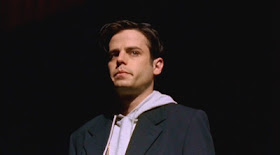 In Slings & Arrows, the faith people have in the character of Jack Crew, action movie star trying to find legitimacy on a Canadian stage, is pretty slim. As he comes into the light to deliver his first speech (we do not see the confrontation with his parents), other actors call it "the moment of truth" and critics sharpen their pencils. Jack himself has little confidence in his performance, and visibly has a hard time swallowing as he eyes the attentive crowd, who are only waiting for him to screw up.
In Slings & Arrows, the faith people have in the character of Jack Crew, action movie star trying to find legitimacy on a Canadian stage, is pretty slim. As he comes into the light to deliver his first speech (we do not see the confrontation with his parents), other actors call it "the moment of truth" and critics sharpen their pencils. Jack himself has little confidence in his performance, and visibly has a hard time swallowing as he eyes the attentive crowd, who are only waiting for him to screw up.We only get to "That it should come to this", but Jack does quite well. As with many characters in S&A, he "uses" his own feelings t inform his character. His insecurity becomes Hamlet's, his outrage and hurt stemming from resident pencil pusher Richard Smith-Jones (who in the previous episode had tried to sabotage his performance) becomes Hamlet's. Jack has his own unweeded garden here, and his sarcasm is palpable.
It is said that Hamlet is such a deep character, there are as many legitimate performances of him as there are actors to play him. S&A plays with that by showing us how an actor's particularities come to inhabit the character and thus the play. They further merge the real world and the world of the play by making Jack as reticent as Hamlet (though of course, there's another Hamlet analog in the story to incarnate his brilliance/madness).
Though I can only discuss Slings & Arrows briefly on this blog, I hope people will try to discover its three 6-episode seasons (Hamlet, MacBeth, King Lear). It's excellent television, and a real charm for Shakespeare fans especially.

S&A was a truly wondrous show, a great look not just at Shakespeare, but at the people presenting Shakespeare, and how good drama (and...interesting...musicals) get tied up with real life.
ReplyDeleteI made some friends watch it, and their response: "It made me want to see the whole plays again." About as fine an endorsement as you can want.
Oh, and...YOUTHQUAKE!!!
Froghammer is just the best thing ever.
ReplyDelete